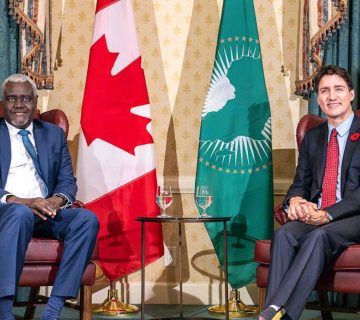The Egypt and Ethiopia row over the Grand Ethiopian Renaissance Dam (GERD) continues to escalate, with both countries stepping up a war of words. The two countries, together with Sudan, were expected to reach an agreement during the last round of talks, held in Washington DC on February 26, 2020, but the negotiations hit a deadlock after Ethiopia failed to send representatives to the meeting, insisting it needed more time to consider the draft agreement generated by the United States (US) with input from the World Bank. Egypt, which initialled the draft, has accused Ethiopia of frustrating the negotiations and being unwilling to reach an accommodation. Ethiopia, on the other hand, has accused US of being biased and overreaching her role as a mediation observer. Given Ethiopia’s misgiving over the neutrality of US, it is unlikely that Washington DC will be able to broker a deal in the near future. However, the African Union (AU), through the strategic deployment of its good offices, could help de-escalate the tensions and create a conducive environment for the resolution of outstanding issues.
Diplomatic moves, military threats and nationalistic appeals
Since the Washington DC standoff, Egypt has stepped up her diplomatic efforts to secure international support for her position over GERD. On March 5, 2020, for example, Egypt secured a resolution from the Executive Council of the Arab League with the exception of Sudan, which affirmed Egypt’s contested narrative on historical rights over the Nile waters and also warned Ethiopia that any interference with the enjoyment of the right will be taken as an affront to the security of the entire Arab world. In addition, Egypt’s Foreign Affairs Minister, Sameh Shoukry, has travelled to Paris, Brussels, Burundi, South Africa, Tanzania, the Democratic Republic of Congo, South Sudan, Niger, and Rwanda to explain Egypt’s position and solicit for support over the matter. Ethiopia, on the other hand, has had President Sahle-Work Zewde visit Kenya, Rwanda and Uganda, countries whose support is crucial to the permanent resolution of the Nile waters politics. More so, Ethiopia has also stepped up a national campaign to consolidate domestic support for the completion of the dam, arguing it’s crucial for development and poverty alleviation.
Besides diplomatic manoeuvres, both Egypt and Ethiopia have indicated that they are open to using a military option to protect their interests and well-being should the negotiations fail For example, on February 29, 2020, Sameh Shoukry said Egypt is ready to use all available options to secure the country’s interests and future. In response, Ethiopia’s top military leadership, led by the Chief of Staff General Adem Mohammed, visited the construction site of GERD where they retaliated their readiness to defend the Country’s sovereignty and development interests.
It is this rhetoric of military confrontations that should spark the AU interest and involvement. A military confrontation between Egypt and Ethiopia could derail ongoing democratization and peacebuilding efforts in Sudan and South Sudan, reduce the focus on fighting al Shabab in Somalia and further destabilize, through proxy wars, the Horn of Africa region.
African Union
Various avenues exist for AU’s involvement in the resolution of the row. First, the African Union Peace and Security Council (PSC) could deploy the Panel of the Wise – a five member committee of highly respected African personalities that complement the work of PSC and the chairperson of the African Union Commission (AUC) – on a preventive diplomacy mission to facilitate a face-to-face meeting between Prime Minister Abiy Ahmed and President Fattah Abdel Sisi. The meeting should seek to de-escalate the ongoing war of words, dispel the threats of military confrontations and most importantly, create the necessary political goodwill for the technical committee to generate a mutually acceptable agreement. The panel should, in turn, regularly monitor compliance, and keep the AU Assembly informed, through the PSC, on the leaders’ commitments.
While ‘dam war’ is a new challenge for the AU, the continental body nevertheless wields enormous political and diplomatic leverage to mediate the row and extract compromises from both parties. The AU chairperson, President Cyril Ramaphosa, and the head of the Commission, Moussa Faki Mahamat, should convene a summit involving Prime Minister Hamdok of Sudan, Prime Minister Abiy, and President Sisi to broker a favorable agreement while giving the technical committee, already established by the parties, ample time to iron out the finer implementation details. This meeting should also put in place strategies for a comprehensive renegotiation of the Nile waters treaties involving all the Nile water countries to prevent similar conflicts from emerging in future.
Lastly, the AU, with the consent of the parties, should appoint neutral experts to join a technical committee to work on the details of refiling and general operation of the dam. This would add an independent voice to the assessment, dispel the fears of the parties and provide the necessary assurances to both Egypt and Ethiopia and therefore facilitate the signing of an agreement on the operation of the dam. Such an agreement will enable the AU to be involved in the monitoring and enforcement, in the event of future violations.
Elvis Salano, Research Assistant, HORN Institute.
Photo: A view of the Blue Nile as it passes through the Grand Ethiopian Renaissance Dam, Ethiopia (Photo Credit: Eduardo Soteras/AFP/Getty Images)



